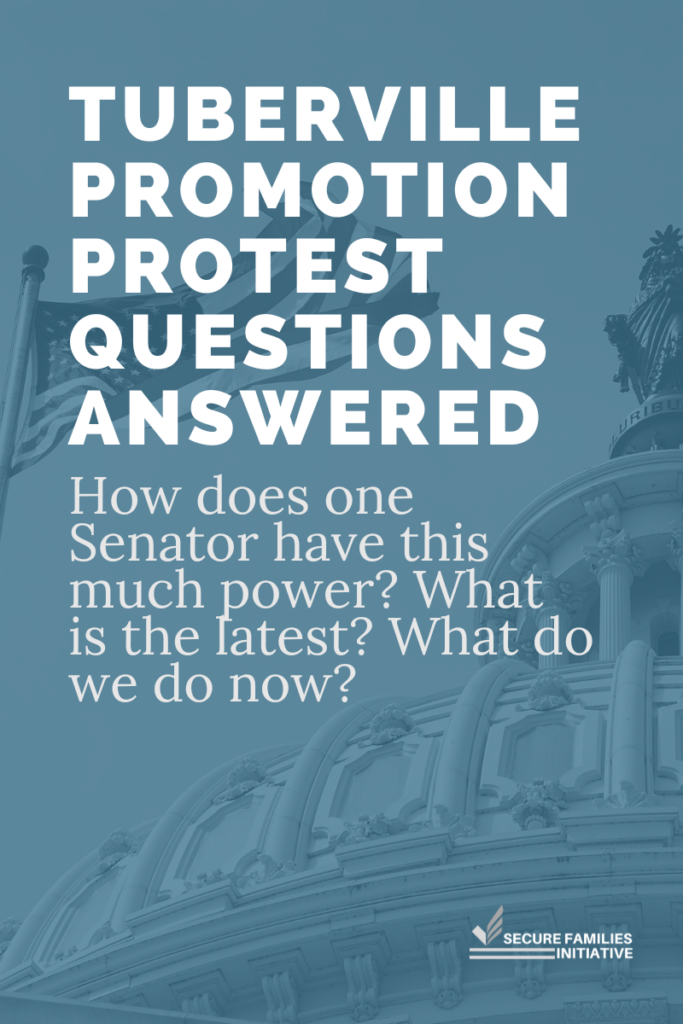Senator Tommy Tuberville is holding up Senate confirmation of military leaders in protest of Department of Defense policy. Secure Families Initiative is proud to lead the military families and spouses in speaking out about the negative impact on our community. We know there are a lot of questions about Tuberville’s protest so we’re answering your most pressing questions here.
Unfortunately, we can’t answer the biggest question: when will Tuberville listen to military leaders and military families and end his inappropriate and unpatriotic hold on promotions?
Tuberville Military Promotion Protest:
Q & A
Q: What is the latest with the promotion protest? Where do things stand now?
A: As of today (August 2), there are nearly 300 outstanding nominations waiting for Senate approval. The Senate is in recess until September. In the meantime, there will be more military nominations and more key vacancies. In fact, the Army Chief of Staff is set to retire this week and the Chief of Naval Operations will retire mid-August.
Before the Senate returns from recess three branches of the military, and three appointments to the Joint Chiefs of Staff, will be held by “Acting” leaders. “[A]cting chiefs are limited in their ability to issue sweeping strategic guidance on the future of their force and don’t command the authority abroad that Senate-confirmed leaders do.” (Military.com)
Q: Why is Senator Tuberville doing this protest and what is he trying to accomplish?
A: Senator Tuberville is holding up military promotions because he opposes a Department of Defense policy which ensures service members can seek reproductive health care if the state they live in prohibits it. As you know, military members do not chose where we live, and since the overturn of Roe v. Wade many military members and their families are now stationed in states where abortion is prohibited. The policy was designed to ensure equal access to care for all service members no matter where they live.
We think it’s important that no matter your opinion on the underlying policy, we must agree that service members and military families will not be used as political leverage. This protest using military as pawns is shameful and unpatriotic. It is past time to end this political showmanship and recommit to respect the service and sacrifice of those who pledge to defend this nation.
Q: How does one Senator have this much power to single-handedly block all military promotions?
A: Approving military promotions has long been one of the most bipartisan duties of the Senate. For decades, the Senate has approved batches of military promotions by voice vote. Military promotions are processed in batches for group consideration and approval via a process called “unanimous consent.”
Unanimous consent is an “agreement on any question or matter before the Senate that sets aside a rule of procedure to expedite proceedings. Many requests for unanimous consent are routine but if any senator objects, the request is rejected.” (U.S. Senate Glossary) Notably, the Senate has traditionally approved the promotions of nonpolitical military personnel by unanimous consent to keep the careers of those service members separate from the political process.
Senator Tuberville’s stunt has effectively frozen confirmations for the current backlog because they are submitted in batches for group consideration and approval. The batching procedure itself requires unanimous consent, allowing even one senator to stand in the way. (NPR)
Q: Can the Senate vote on the nominations one-by-one to escape the single objector?
A: Senator Tuberville has suggested that an alternative to his blocking unanimous consent is for the Senate to vote on each nomination one-by-one. And, in theory that is possible, but it is highly inefficient and time-consuming. The Senate majority leader could bring the nominations to the floor one at a time for consideration by regular procedure, but the regular Senate process require two to three days for each vote.
Even if the Senate had tried to individually process and vote individually on the first 150 promotions Tuberville blocked back in February, the Senate would be so swamped with these votes that they would not have had time to do much else – and they would still be far behind on confirmations. Frankly, it’s just impractical to vote on them individually, and it allows Tuberville to hijack what has historically been a simple, apolitical process. Switching to a one-by-one process sets a dangerous precedent and does nothing to prevent any Senator from hijacking Senate business in the future.
Q: Can Senator Tuberville be removed from this committee?
A: Senator Tuberville is a member of the Senate Armed Services Committee. However, his committee membership is not what gives him the power to single-handedly block promotions on the Senate floor. Any one Senator can object to unanimous consent, regardless of committee.
Q: How do our enemies perceive these vacancies?
A: We don’t know for certain how this is being perceived by hostile foreign countries, but there’s no doubt they’re paying attention.
In a letter signed by seven former Defense Secretaries from both political parties, the former Pentagon chiefs warned:
“The current hold… is preventing key leaders from assuming important, senior command and staff positions around the world… Some are unable to take important command positions, such as leading the 5th Fleet in Bahrain and the 7th Fleet in the Pacific, which are critical to checking Iranian and Chinese aggression. Leaving these and many other senior positions in doubt at a time of enormous geopolitical uncertainty sends the wrong message to our adversaries and could weaken our deterrence.”
Additionally, Secretary of Defense Lloyd Austin has said the promotion blockade is “a national security issue. It’s a readiness issue.” He was more specific and blunt recently: “And, so I would ask Sen. Tuberville to lift this hold, and if you think about it, I would imagine our adversaries would look at something like this and be pretty happy that that we create this kind of turbulence [and] put that on our force.” (Stripes)
Military.com also suggests it impacts the US relationship with allies as well as adversaries because Acting leaders do not have the same authorities or permanence as confirmed leaders. “Acting officials are also often viewed with trepidation by foreign counterparts and allies, who don’t know how much to trust the choices or assurances of someone who hasn’t been confirmed for the job.”
Q: Is this protest related to the Air Force PCS freeze?
A: The two issues are NOT related, however they are both prime examples of a troubling and growing trend of legislators inserting politics into the governance of military policy.
Senator Tuberville is blocking military promotions because he objects to a Department of Defense policy that grants permissive leave and travel for service members to seek reproductive health care.
The Air Force funding shortfall was caused because members of the U.S. House of Representatives refused to grant an Air Force request to reallocate funds to cover the higher than projected personnel costs.
Military Times explains: “In any given year, the Air Force may ask Congress for authority to reprogram funds for various reasons when there is a shortfall in one area. But this year, according to one source, the request hasn’t been approved due to a political spat between the Colorado and Alabama congressional delegations over the administration’s delay in deciding where U.S. Space Command headquarters will be located.” In short, members of the House Armed Services Committee delayed approval to shift the money around because Representatives were fighting about the future location of Space Command.
Q: Does the Senator have a proposed path forward for what he thinks should be available to military families when it comes to reproductive rights if he disagrees with the status quo?
A: Senator Tuberville is demanding the Pentagon change its policy to support service members and their families in traveling out of state to receive an abortion. Despite his claims, the military does not pay for the procedure but does grant leave and pay for travel to seek health care when a service member is stationed in a state that bans it.
Tuberville was offered a committee and / or floor vote to codify or ban the policy, the normal legislative channel to address a conflict such as this, but Tuberville still refuses to end his protest.
Q: What can military family members and supporters do to urge an end to this protest?
A: We are so glad you asked! We are not going to stop fighting this promotion blockade until the Senator ends his protest and the Senate confirms military leaders. Here’s how you can join in this fight with us:
- Join our Monthly Member Call on Tuesday, August 15 at 8:30 PM ET which will focus on organizing to end the block on military promotions. We will provide updates, discuss how to mobilize our community, and create a plan of action for August and into the fall.
- Continue to circulate our petition as we will re-deliver it when we reach signature milestones.
- Become an SFI Member to receive updates from us on this issue directly to your inbox.
Additional Resources
- Petition: Stop Playing Politics with Our Military
- Remarks at the Capitol Before Delivering Petition
- SFI Executive Director on CNN News Central
- SFI Communications Director on The Source with Kaitlan Collins


